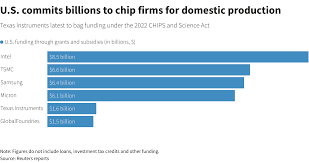In a significant boost for the semiconductor industry and a strategic move by the U.S. government to strengthen its position in global technology, Texas Instruments (TI), a leading chipmaker, has secured up to $1.6 billion in funding from the U.S. government. This funding marks a pivotal moment for both the company and the broader semiconductor sector, highlighting the increasing importance of technology in national economic and security strategies.
Table of Contents
Background of Texas Instruments
Texas Instruments, founded in 1930, is a major player in the global semiconductor industry. Known for its innovation and leadership in developing a wide range of electronic components, TI’s products are crucial in numerous applications, from consumer electronics to industrial machinery and automotive systems.

- Product Range: Texas Instruments specializes in analog and embedded processing chips, which are essential for converting real-world signals into digital data and controlling various electronic systems. Their products are used in devices like smartphones, automotive electronics, and industrial automation systems.
- Global Presence: TI operates on a global scale, with a broad manufacturing footprint and research and development facilities around the world. The company’s products are integral to many sectors, underscoring its significance in the global technology supply chain.
The Need for Funding
The semiconductor industry has faced numerous challenges in recent years, including supply chain disruptions, geopolitical tensions, and increasing demand for advanced technology. Texas Instruments, like many other chipmakers, has been affected by these issues, leading to a strategic push for expansion and investment.
- Supply Chain Disruptions: The COVID-19 pandemic and subsequent geopolitical tensions have highlighted vulnerabilities in the global semiconductor supply chain. These disruptions have impacted production and availability, stressing the need for increased domestic manufacturing capacity.
- Technological Advancements: The rapid pace of technological advancement requires ongoing investment in research and development. Companies like Texas Instruments need to stay ahead of the curve to maintain their competitive edge and meet evolving market demands.
- National Security Concerns: The U.S. government has recognized the strategic importance of semiconductor technology in national security and economic competitiveness. Investments in domestic chip production are seen as crucial for reducing dependence on foreign sources and bolstering national resilience.
Details of the Funding Agreement
The funding from the U.S. government is part of a broader initiative to support domestic semiconductor manufacturing and innovation. Key aspects of the agreement include:
- Amount and Structure: Texas Instruments will receive up to $1.6 billion in funding, which may be allocated over several years. The funding is intended to support various initiatives, including expansion of manufacturing capacity, research and development, and workforce training.
- Usage of Funds: The funds will be used to build and upgrade semiconductor manufacturing facilities, invest in new technologies, and enhance production capabilities. This includes both the construction of new plants and the modernization of existing facilities.
- Economic Impact: The investment is expected to have a substantial economic impact, creating jobs, fostering technological innovation, and strengthening the domestic semiconductor supply chain. It aligns with broader national goals of economic growth and technological leadership.
- Partnerships and Collaboration: The funding agreement may involve partnerships between Texas Instruments and various stakeholders, including government agencies, research institutions, and other technology companies. Collaboration is a key component in leveraging the funding for maximum impact.
Implications for Texas Instruments
The funding has significant implications for Texas Instruments, both in terms of its operational capabilities and strategic positioning:
- Enhanced Manufacturing Capacity: The investment will allow TI to expand its manufacturing footprint, increasing its production capacity and ability to meet growing market demands. This is crucial for addressing supply chain issues and ensuring a steady supply of critical semiconductor components.
- Technological Advancements: With additional resources for research and development, Texas Instruments can accelerate innovation and develop new technologies. This will help the company maintain its competitive edge and address emerging trends in the semiconductor industry.
- Job Creation: The funding is expected to create job opportunities in the technology and manufacturing sectors. This includes both direct employment at TI’s facilities and indirect employment through the broader supply chain.
- Market Position: By strengthening its domestic manufacturing capabilities, Texas Instruments can enhance its market position and reduce its reliance on overseas production. This aligns with national objectives to boost domestic technology capabilities and reduce dependence on foreign sources.
Broader Industry and Economic Impacts
The funding for Texas Instruments also has broader implications for the semiconductor industry and the U.S. economy:
- Strengthening the Supply Chain: Investment in domestic semiconductor manufacturing helps address vulnerabilities in the global supply chain. By increasing domestic production, the U.S. can reduce its dependence on foreign sources and mitigate the risks associated with supply chain disruptions.
- Promoting Innovation: The funding supports research and development efforts, fostering innovation within the semiconductor industry. This can lead to advancements in technology, improved performance of electronic devices, and new applications across various sectors.
- Economic Growth: The investment is part of a broader effort to stimulate economic growth through technology and manufacturing. It supports job creation, infrastructure development, and technological advancement, contributing to overall economic development.
- National Security: Strengthening domestic semiconductor capabilities is a key aspect of national security. can better safeguard its technological assets and ensure the resilience of critical infrastructure.
Challenges and Considerations
While the funding represents a significant boost for Texas Instruments and the semiconductor industry, several challenges and considerations remain:
- Implementation: Effective implementation of the funding will be crucial. Texas Instruments will need to manage the expansion and development projects efficiently to realize the benefits of the investment.
- Global Competition: The semiconductor industry is highly competitive, with major players in various regions vying for market share. Texas Instruments will need to navigate this competitive landscape and leverage the funding to maintain its leadership position.







